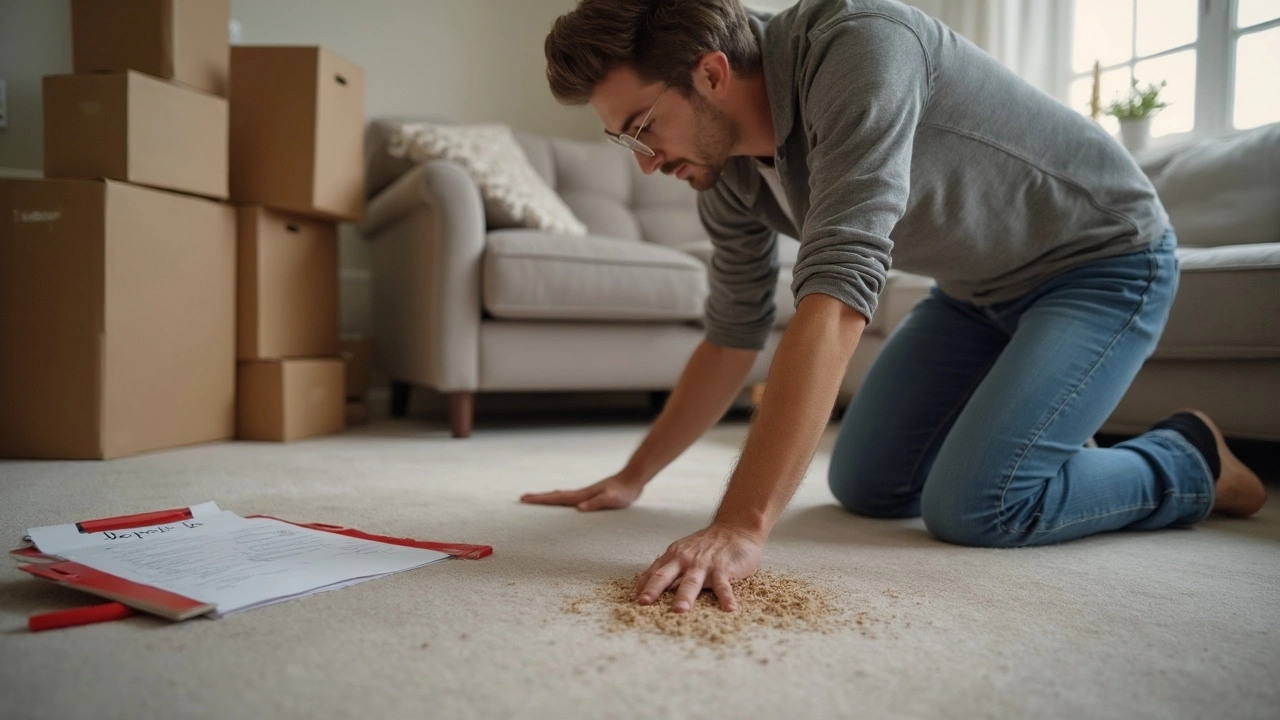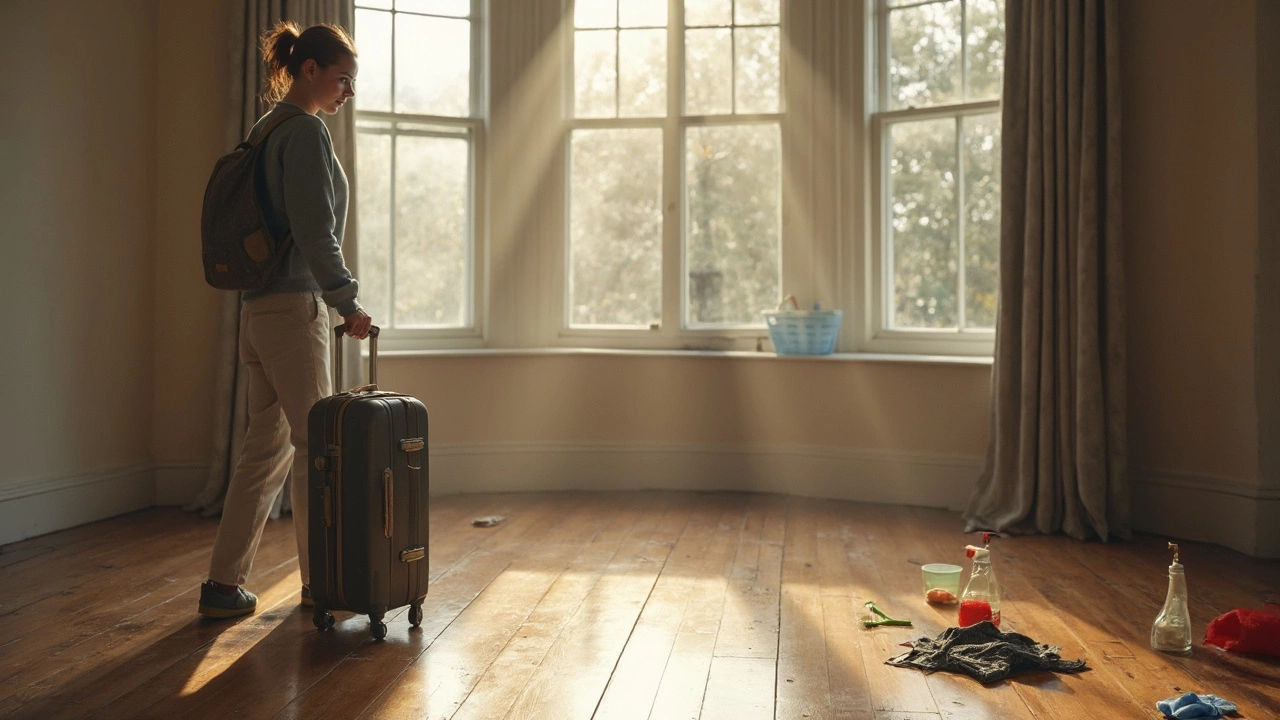Ever see those checkout inspection checklists that look like they were made for robots? Yeah, most of us have, and it’s easy to feel overwhelmed. But here’s the deal: landlords don’t care if your place is ready for a magazine shoot—they just want it to be at least as clean as when you moved in. If you slack off, they’ll happily send you the bill. Hate the idea of losing your deposit? Cleaning matters. Big time.
So, what do they expect? No dust bunnies behind the toilet, no grease sticking to the oven, and no “science projects” growing in the fridge. We’re talking about a deep clean—much more than your regular Saturday routine. Even if you’re busy packing or you’ve got a dog like Charlie tracking paw prints through the hallway, you can’t cut corners. Every spot you skip might show up on your landlord’s radar and, worst case, on an invoice you weren’t expecting.
- What Landlords and Agents Really Want
- Rooms and Spots You Can’t Ignore
- Big Cleaning Mistakes That Can Cost Your Deposit
- Quick Cheats and Real-Life Tips
What Landlords and Agents Really Want
The golden rule with end of tenancy cleaning: they want the place to look as clean as it did right when you moved in. This isn’t about random perfection, it’s about matching up with either the first inventory photos or the checklist. If your landlord or agent gave you an inventory when you moved in, that’s your blueprint. They’re not looking for miracles, but they can (and do) keep a chunk of your deposit for anything that’s not actually clean.
Here’s what’s at the top of their want list:
- Kitchen free of grease and food stains – Ovens, hobs, work surfaces, and sinks get the eagle-eye treatment. Leftover grime is the number one thing they notice.
- Bathroom sparkling – Mildew, hair, limescale, and toothpaste marks? Nope. Every surface should be wiped down and disinfected.
- Floors dust and mark-free – Carpets should be vacuumed (and ideally cleaned if you had pets), hard floors mopped until they look fresh.
- Windows and sills wiped – No one likes sticky fingerprints or dusty ledges.
- Walls and doors – Major scuffs or sticky marks stand out. They're not expecting fresh paint, but they do expect the walls not to look trashed.
When deposit deductions happen, the most common cleaning complaints break down like this:
| Cleaning Issue | Percentage of Deposit Disputes Involving Issue (UK, 2024) |
|---|---|
| Oven & kitchen grime | 56% |
| Bathroom mould/limescale | 42% |
| Dirty carpets/floors | 39% |
| Marks on walls & doors | 25% |
| Windows not cleaned | 18% |
Agents often use professional cleaners for the final check. If you’ve skipped big jobs or left clear dirt behind, you can bet you’ll see the cleaning cost taken out of your deposit—sometimes way more than if you’d done it yourself. If in doubt, always compare to the inventory and walk through the property with your checklist or those all-important move-in photos. Don’t just hide the mess in cupboards—they check those too.
Rooms and Spots You Can’t Ignore
Here’s where most people drop the ball: missing the obvious zones. For end of tenancy cleaning, you need to focus on the rooms and corners landlords always check. Even if the living room shines, if you skip the kitchen or bathroom, goodbye deposit.
Let’s get specific. Most rental agreements mention these as non-negotiables:
- Kitchen: Scrub the oven, backsplash, sinks, and behind appliances (yeah, pull out the fridge—you'll be amazed at what’s crammed under there). Wipe cupboards, clean inside the microwave, and don’t forget light switches.
- Bathroom: Remove limescale from taps and showerheads. Clean grout, polish mirrors, wipe tiles, disinfect the toilet, and check around the base for stray hair or dust.
- Floors: Vacuum carpets (get stains out with an actual carpet cleaner if needed), mop hard floors, and don’t skip under furniture. Landlords look there first.
- Windows and Sills: Give windows a full clean, inside and out if you can safely reach. Wipe the sills and even the tracks. Set-in dirt here is a classic deduction line.
- Living and Bedrooms: Dust everything—shelves, skirting boards, light fittings, curtain rails. Check wardrobes for forgotten stuff and give them a wipe inside.
- Entryways and Hallways: These make a first impression. Clear cobwebs, wipe handles and switches, and sweep thoroughly.
Landlords and agencies almost always use a checklist. Here’s what a typical end of tenancy inspection covers:
| Area | Specific Checks |
|---|---|
| Kitchen | Oven/hob clean, fridge defrosted, bins emptied, cupboards wiped, taps polished |
| Bathroom | Shower/tub limescale, sink and toilet scrubbed, mirrors streak-free |
| Living Room | Dusting, carpet vacuumed, upholstery clean, electronics dust-free |
| Bedrooms | Wardrobes empty, mattresses vacuumed (if furnished), dust everywhere |
| Windows | Glass cleaned inside/outside, sills and frames wiped, blinds dusted |
| Floors | Stain-free, crumbs gone, no pet hair (big one if you have a dog) |
Don’t want to miss a deposit deduction? Focus on things you wouldn’t normally clean: tops of doors, behind radiators, under beds, inside extractor fans. Spot check every corner with a flashlight. It’s wild how much dirt hides until you put a beam on it.

Big Cleaning Mistakes That Can Cost Your Deposit
If you want your deposit back, you can’t afford to get sloppy on the details. Landlords and agencies are picky—there’s no way around it—and most deductions come from cleaning problems that renters didn’t even notice.
- End of tenancy cleaning isn’t just about wiping down counters. Over 60% of deposit disputes are linked to cleanliness, especially kitchens and bathrooms. Forgetting the oven, extractor fan, or fridge is a costly rookie mistake. Landlords are known to charge over £40 just for oven cleaning in the UK, and those numbers aren’t made up.
- Neglecting carpets and floors gets people every time. If you have pets or lots of foot traffic, hair and dirt can pile up fast. Vacuuming isn’t enough—sometimes you need a proper carpet clean. Agents can spot dog fur like hawks, and charges for pro carpet cleaning can run you £60-£120 per room.
- Ignoring limescale on taps or showerheads is another big one. In hard water areas, this builds up quickly. It’s visible, and it shows you didn’t do a deep clean. It’s often listed as a top reason deposits are held back, right after kitchen grime.
- Windows are the silent killer. Smears, fingerprints, and dusty sills? Commonly missed, but often checked during inspections. Professional window cleaning costs can reach £20 per window.
- Missing hidden spots—think behind radiators, under beds, or inside cabinets—is risky. Most inspection checklists cover these, even if the last thing you want to do is crawl around on your knees after packing up your life.
- Leaving behind rubbish. Sounds silly, but agents often fish for leftover bins or random junk. UK cleaning companies say about 30% of renters forget a bag of trash or two in cupboards or sheds.
Here’s a quick breakdown of common cleaning charges renters have faced for missed spots (UK letting agency data, 2023):
| Missed Area | Average Charge (£) |
|---|---|
| Oven cleaning | 45 |
| Carpet or rug cleaning (per room) | 70 |
| Window cleaning (per window) | 20 |
| Bathroom de-limescale | 30 |
| Rubbish removal | 55 |
The bottom line: Don’t leave cleaning until the last minute and don’t guess at what needs doing. Go through your original inventory, tick off each item, and make sure everything matches how it looked when you moved in. If you can’t face it, consider spending on a pro clean—it might just save your deposit and some serious stress.
Quick Cheats and Real-Life Tips
Pressed for time or just don’t want to scrub for hours? Here’s how real people actually get their places looking good enough to pass those picky move-out checks. These tips work whether you’re renting a studio or a four-bedroom house—trust me, most landlords look at the same problem spots, every time.
- end of tenancy cleaning: Focus on kitchens and bathrooms first. Ovens, fridges, and toilets are always on the inspection list. Got serious built-up grime? Spray cleaner in the oven, let it sit while you clean something else, and then come back—it’s a lot easier.
- Use baking soda on carpet stains. Sprinkle it, let it sit for at least 30 minutes (an hour is better), then vacuum it up. For pet stains, like if Charlie had an accident, white vinegar mixed with water works surprisingly well.
- Quick window fix: A little dish soap in warm water, wipe with a microfiber cloth, then buff with newspaper for streak-free glass. No need to hire a pro unless your lease says so.
- Walls and doors: Magic erasers lift fingerprints and scuffs in seconds. Don't repaint unless you’ve made a serious mess; most leases expect “ordinary wear.”
- Don’t forget hidden spots: tops of cabinets, window sills, and inside kitchen drawers. Agents check there more often than you’d think.
Still worrying? Here’s a look at the inspection spots most likely to get flagged (and cost you cash):
| Area | Most Common Issue | Quick Fix |
|---|---|---|
| Kitchen oven | Baked-on grease | Oven cleaner, leave for 30 min, wipe |
| Bathroom tiles & grout | Mold & stains | Scrub with vinegar/baking soda mix |
| Carpets | PET stains or odors | Baking soda + vacuum |
| Window sills | Dust build-up | Quick wipe with damp cloth |
| Fridge | Sticky spills | Soap + water, rinse, wipe dry |
If you’re in a rush, tackle just these five and you’ll dodge most cleaning deductions. For everything else, have a friend do a walk-through—or bribe them with pizza if you have to. You’d be surprised what a fresh pair of eyes will spot that you missed. In the end, getting most of your deposit back is usually about focusing on the stuff that matters, not being perfect.
